Rates
Dates
Rates:
PER PERSON :
$ 2,890.00 (double / twin occupancy)
Dates:
Included:
- 2 nights in Warsaw
- 3 nights in Gdansk
- 2 nights in Wroclaw
- 5 nights in Krakow
- First class trains: Warsaw - Gdansk - Wroclaw - Krakow
- Minibus with A/C for all tours
- Professional licensed tour guides for all tours
- 4* centrally located hotels with daily breakast
- city tours of Warsaw, Krakow, Zakopane,Wroclaw, Torun and Gdansk with licenced guides
- sightseeing of Malbork Castle, Auschwitz-Birkenau Museum and Wieliczka Salt Mines
- organ concert in Gdansk-Oliwa
- foklore show in the outskirts of Krakow
Itinerary:
This small group private tour to Poland involves staying in four major historical cities such as Warsaw, Gdansk, Wroclaw and Krakow and daily tours visiting major attractions around.
Upon arrival, we will meet you and transfer to the hotel.
Overnight in Warsaw
Full day city tour of Warsaw, Warsaw Uprising Museum
City tour of Warsaw, Warsaw Uprising Museum, and Chopin concert.
Today we will go on a full-day city tour showcasing the best of Warsaw. You will see the charming Old Town, which was painstakingly rebuilt from scratch after World War II. You will also see the historic Jewish Ghetto, the busy downtown, and the elegant Royal Route, which includes one of Europe's best 18th-century royal residences, the Palace on the Water in the Lazienki Gardens.
In the afternoon, we'll go to the Museum of the Warsaw Uprising, which is widely thought to be the best new museum in Poland. It tells about the uprising of 1944, which left marks on the city that are still visible today.You will also have free time to walk around the cobblestone streets of the Old Town and look for signs of restoration on the facades of the old houses.
Overnight in Warsaw (B)
Teutonic Knights Heritage: Malbork Castle & Gdansk
Transfer to the train station. Fast train to Gdansk leaves at 10:30 am and arrives at 1:00 pm. Meet your guide and driver at the train station. Stop for lunch en route to Malbork Castle
Tour the Castle of the Teutonic Order in Malbork, a UNESCO World Heritage Site and one of the most important landmarks in Poland. Learn about the Teutonic Order's history and explore the world's largest brick Gothic castle. In 1274, over 40 years after the Prussian conquests, the Teutonic Order started building Malbork Castle. Over time, it became the most important building for the Teutonic Knights, where the Teutonic Master lived, so it became the capital of the Teutonic State. Visit the 14th-century Palace of the Grand Master, the home of the so-called Grand Master of the Teutonic Order; St. Mary's Church in High Castle; permanent and temporary exhibitions like collections of weapons, armor, and flags; and the huge Amber Museum in Middle Castle.
Overnight in Gdansk (B, L)
Gdansk Old Town, Oliwa and Shipyards
n the morning, we will explore Gdansk's Old Town. Gdansk is one of the most popular places to visit in Poland because it used to be the wealthiest port city in the country. As a result, its Old Town has a strong sense of the sea and a lot of unique Hanseatic-style buildings. You will see the Old Town, St. Mary's (the largest Gothic church in Poland), the Neptune Fountain, and the Artus Court.
After that, we will take you to the district of Oliwa, which has a beautiful cathedral from the 13th century known for its highly complex pipe organs. You will have free time in Gdansk after the organ recital.
Today we will also visit the former premises of Gdańsk Shipyard. The tour stops at the most important places related to the "Solidarity" movement, which began in the Gdansk Shipyard and was the beginning of the fight for freedom from the USSR and against communism in Eastern Europe. In the European Solidarity Center, you will see exhibits, videos, and interactive maps related to the Solidarnosc movement in Gdansk, Pomerania, and all over Poland. You will also be able to get to know the history of Communism, its collapse in the entire socialist bloc, and perhaps meet Lech Walesa, who has his office in the ECS.
Overnight stay in Gdansk (B)
After breakfast, we leave Gdansk and head south to Torun. We will tour Torun Old Town, which is on the UNESCO World Heritage Sites list. It has survived many wars and invasions and still has many of its original Gothic buildings, such as a beautiful town hall, medieval fortification walls, the Polish "leaning tower of Pisa," and the beautiful St. James' church.
Gingerbread has always been the town's claim to fame. You can try it in different sizes and shapes. Torun might be the best surprise of the whole trip, as it always makes a memorable impression.
Overnight in Gdansk (B, L)
After breakfast, transfer to the train station and take a train to Wrocaw. The train ride takes about 5 hours. Upon arrival in Wroclaw, short city tour and early dinner. Hotel chek-in.
Overnight in Wroclaw (B, D)
In the morning a sighseeing tour of Wroclaw Old Town.
In the afternoon we will drive to see the two most important monuments in the whole Lower Silesia region: Ksiaz Castle and Swidica Church of Peace.
We will visit Ksiaz Castle, built in the 13th century by Prince Bolko I. Located on a rocky hilltop surrounded by woods, it makes a huge impression on visitors. Ksiaz Castle has been owned by a number of different states over the centuries. Today, it houses a museum that we will visit.
We continue to Swidnica to visit the largest wooden baroque church in the world and the famous UNESCO World Heritage Site – Church of Peace. It's one of the two surviving Protestant "peace churches" built after the Peace of Westphalia, which ended the so-called Thirty Years' War (1618–1648). Afterwards, we will have a bit of free time for a short walk around the beautiful Main Market Square of Swidnica.
You can visit the beautiful university hall or take a complimentary trip to Swidnica, a small town 70 kilometers away from Wroclaw. Swidnica is famous for its wooden Church of Peace, inscribed on the UNESCO World Heritage List. After the Thirty Years' War, it was one of only three places in Silesia where Protestantism was allowed. The church itself was built without a single nail.
Overnight in Wroclaw (B, L)
Free time after breakfast. Then, transfer to the train station. A fast train from Wroclaw to Krakow takes approximately 3-hours departing at 12:48 pm and arriving in Krakow at 3:45 pm. Meet your driver and guide at the train station in Krakow.
Short sightseeing tour and dinner. Hotel check-in.
Overnight in Krakow (B, D)
A morning tour of Krakow promises to be a feast for the senses. It includes exploring the medieval part of the town with the main town square, the largest square in Europe, the exciting churches with different architectural styles, and the most beautiful streets full of old-world charm.
The Church of the Virgin Mary is home to the world's largest wooden altar. Carved by Veit Stoss between 1477 and 1489, it opens its wings daily, and we will be there to see it. A trumpeter plays the haunting Hejnal alarm call every hour from one of its twin towers.
We will also walk through the Cathedral and the Belfry on a tour of the famous Wawel Castle.
After lunch, you'll have free time to walk around Old Town.
In the evening, we'll take you to one of Krakow's best restaurants for a delicious dinner. You will have the chance to learn how to make pierogi, a traditional Polish dish, a dumpling filled with meat, vegetables, or fruit.
Overnight in Krakow (B, D)
Visit Zakopane to see the unique, regional style of wooden architecture. Enjoy most picturesque view over the Tatra mountains from the top of Gubałówka. Don’t worry – there won’t be any need for perilous climbing – you will reach it by a funicular!
Visit the old cemetery, where tombs of famous Polish writers or poets can be found. Take a walk on Krupówki, the perfect place to purchase some regional souvenirs, and learn more about the history and culture of this highlander region at the Tatra Museum.
Last but not least, visit the old wooden church in Jaszczurówka. End the day in Zakopane with a delicious dinner at a traditional highlander restaurant. After that, return to Kraków.
Overnight in Krakow (B, D)
Wieliczka Salt Mine is a tourist attraction located in the town of Wieliczka, Poland. It is a historic salt mine that has been in operation since the 13th century, and is a UNESCO World Heritage Site. The mine is over 287 kilometers (178 miles) long and extends to a depth of 327 meters (1,073 feet) below the surface. It contains a network of tunnels and chambers, as well as a number of underground chapels and statues that have been carved out of the salt. The mine is also home to a saline lake, known as the "Dead Sea of Poland," which is said to have therapeutic properties. Visitors to the Wieliczka Salt Mine can take guided tours through the underground chambers and learn about the history of salt mining in the region.
Auschwitz was a network of concentration and death camps located in Poland during World War II. It was operated by the Nazi regime, led by dictator Adolf Hitler, and was the site of the largest mass murder in history. Between 1.1 and 1.5 million people, the vast majority of whom were Jews, were killed at Auschwitz. Others who were killed at the camp included Romani people, homosexuals, disabled individuals, and political prisoners. Many prisoners at Auschwitz were subjected to horrific conditions, including forced labor, starvation, disease, and medical experimentation. The camp was liberated by Soviet forces in January 1945.
Auschwitz is now a museum and memorial site and is open to tourists. It is located in Oświęcim, Poland, which is about 50 miles west of Krakow. The museum consists of three main parts: Auschwitz I, which was the original concentration camp; Auschwitz II-Birkenau, which was an extermination camp; and Monowitz, which was a labor camp. Visitors to the museum can take guided tours, which are offered in a variety of languages, and can see exhibits and artifacts related to the camp's history. It is important to remember that Auschwitz is a place of great significance and solemnity, and visitors are expected to behave with respect and dignity while on the grounds.
Overnight in Krakow (B, D)
Yes, Częstochowa is a city in southern Poland that is a popular tourist destination. It is home to the Jasna Góra Monastery, which is one of the most important Catholic pilgrimage sites in the world. The monastery is home to the Black Madonna, a famous icon of the Virgin Mary that is believed to have miraculous powers. The city of Częstochowa is also known for its art and cultural heritage, and there are many museums, galleries, and theaters to visit. Other popular tourist attractions in the city include the Pauline Fathers Monastery, the Wawel Hill, and the Częstochowa Museum.
Overnight in Krakow (B, D)
Breakfast. Hotel check-out and transfer to the airport.
(B)
 East West Tours
East West Tours Nordic Saga Tours
Nordic Saga Tours

 Send
review
Send
review Print
Print 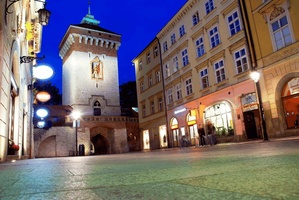

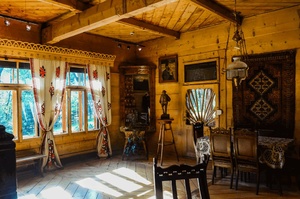
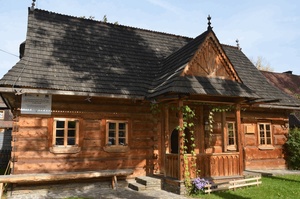
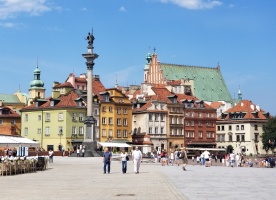
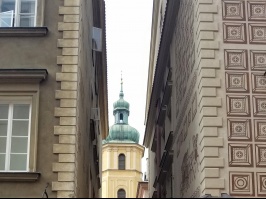
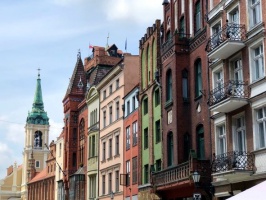 ` &else=`
` &else=`